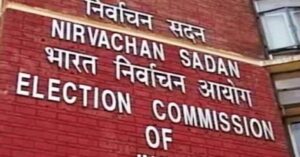A panel comprising Justices Sanjiv Khanna and Dipankar Datta is set to address all concerns regarding Electronic Voting Machines (EVMs) during a hearing scheduled for April 16, 2024.
Tomorrow, the Supreme Court will review a series of petitions advocating for the implementation of Voter Verifiable Paper Audit Trail (VVPAT) to cross-verify votes. VVPAT offers an independent mechanism for voters to ensure the accuracy of their votes by generating a paper slip that confirms their selections. These slips, securely sealed, can be accessed in case of disputes.
In anticipation of the upcoming seven-phase Lok Sabha elections beginning on April 19, the Supreme Court is poised to examine crucial matters regarding EVMs and VVPAT.
Earlier, the Supreme Court had deferred hearing the plea filed by the NGO Association for Democratic Reforms (ADR) and other related matters. Advocate Prashant Bhushan had urged an expedited hearing on April 3.

Now, ADR has petitioned the Supreme Court to direct the Election Commission and the Central Government to ensure voters can verify that their votes have been accurately recorded through VVPATs. The plea aims to align the EVM count with verifiably cast votes and guarantee that voters can confirm their selections via VVPAT slips.
Additionally, the petition underscores the importance of voters verifying that their choices have been accurately registered, which is partially addressed by the brief display of VVPAT slips after pressing the EVM button.
Justices Sanjiv Khanna and Dipankar Datta’s panel, unable to address previous EVM-related pleas, will now consider all petitions during Tuesday’s session. Both petitions will be on the docket for today’s hearing.
On April 1, the Supreme Court sought responses from both the Election Commission of India and the central government regarding activist Arun Kumar Agrawal’s plea for a comprehensive count of VVPAT slips in elections, challenging the current practice of sampling only five randomly selected EVMs per assembly segment.

